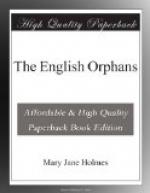“But where’s the money coming from?” said he.
Mary laughingly asked him how many bags of shoes he supposed she had stitched during the last two years.
“More’n two hundred, I’ll bet,” said he.
“Not quite as many as that,” answered Mary; “but still I have managed to earn my clothes, and thirty dollars besides; and this, together with my school wages, will pay for one term, and part of another.”
“Well, go ahead,” returned Mr. Knight. “I’d help you if I could. Go ahead, and who knows but you’ll one day be the President’s wife.”
Like the majority of New England farmers, Mr Knight was far from being wealthy. From sunrise until sundown he worked upon the old homestead where his father had dwelt. Spring after spring, he ploughed and planted the sandy soil. Autumn after autumn he gathered in the slender harvest, and still said he would not exchange his home among the hills for all the broad acres of his brother, who at the far West, counted his dollars by the thousands. He would gladly have helped Mary, but around his fireside were six children dependent upon him for food, clothing, and education, and he could only wish his young friend success in whatever she undertook.
When Widow Perkins heard that Mary was going away to school, she forgot to put any yeast in the bread which she was making, and bidding Sally Ann “watch it until it riz,” she posted off to Mrs. Mason’s to inquire the particulars, reckoning up as she went along how much fourteen weeks’ wages would come to at nine shillings (a dollar and a half New England currency) per week.
“’Tain’t no great,” said she, as simultaneously with her arrival at Mrs. Mason’s door, she arrived at the sum of twenty-one dollars. “’Tain’t no great, and I wouldn’t wonder if Miss Mason fixed over some of her old gowns for her.”
But with all her quizzing, and “pumping,” as Judith called it, she was unable to ascertain any thing of importance, and mentally styling Mrs. Mason, Mary, Judith and all, “great gumpheads,” she returned home, and relieved Sally Ann from her watch over unleavened bread. Both Mrs. Mason and Mary laughed heartily at the widow’s curiosity, though, as Mary said, “It was no laughing matter where the money was to come from which she needed for her books and clothing.”
Every thing which Mrs. Mason could do for her she did, and even Judith, who was never famous for generosity; brought in one Saturday morning a half-worn merino, which she thought “mebby could be turned and sponged, and made into somethin’ decent,” adding, in an undertone, that “she’d had it out airin’ on the clothes hoss for more’n two hours!”
Sally Furbush, too, brought over the old purple silk which “Willie’s father had given her.” She was getting on finely with her grammar, she said, and in a few days she should write to Harper, so that he might have time to engage the extra help he would necessarily need, in bringing out a work of that kind!




